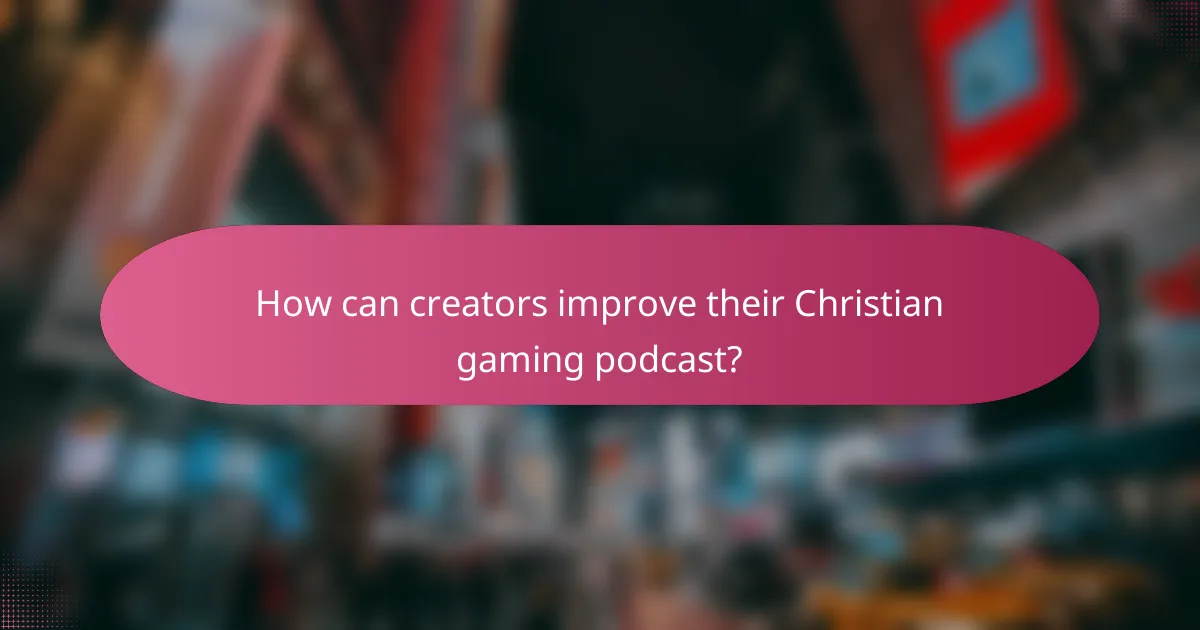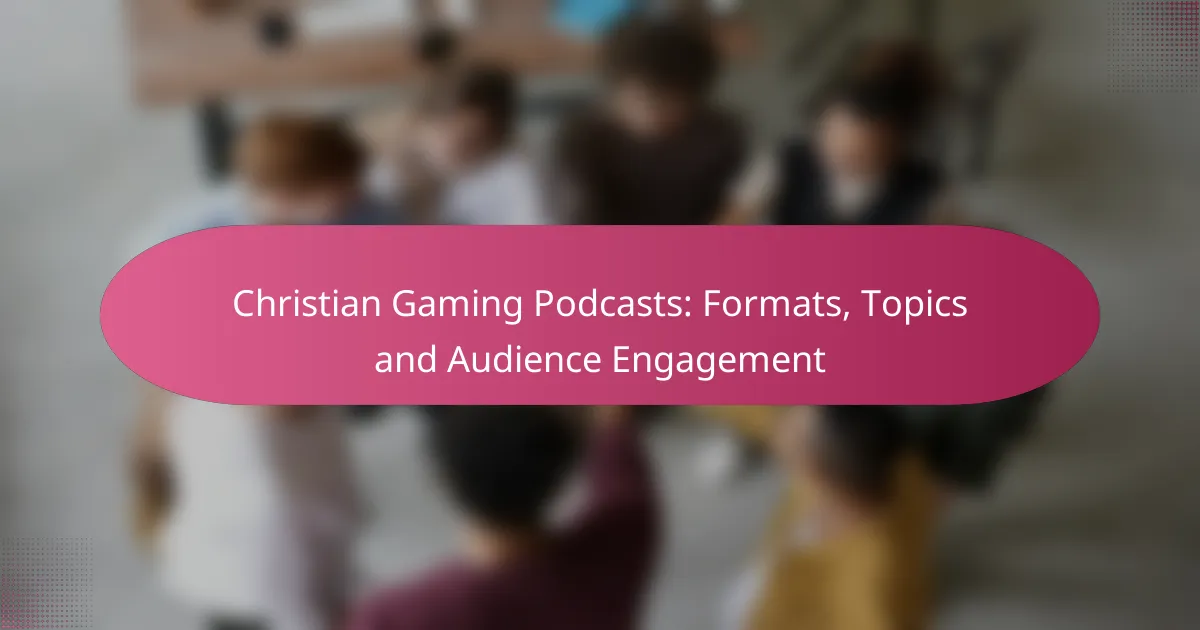Christian gaming podcasts serve as a vibrant intersection of faith and gaming culture, offering listeners a unique platform to explore spirituality within the gaming experience. By employing interactive formats such as Q&A sessions and community-driven content, these podcasts foster engagement and connection among their audiences. With diverse formats like interviews and roundtable discussions, they cater to various preferences, enriching the overall listening experience.

What are the best Christian gaming podcasts for audience engagement?
Some of the best Christian gaming podcasts for audience engagement combine faith-based discussions with gaming culture, creating a unique platform for listeners. These podcasts often explore themes of spirituality in gaming, offer community interaction, and provide insights into how faith influences the gaming experience.
The Bible for Gamers
The Bible for Gamers focuses on integrating biblical teachings with gaming narratives. Each episode discusses specific games and how they reflect or contradict Christian values, encouraging listeners to think critically about their gaming choices.
This podcast often features guest speakers from the gaming industry, providing diverse perspectives on how faith can shape gaming experiences. Engaging with the community through social media enhances listener interaction and feedback.
Faith & Gaming
Faith & Gaming is dedicated to exploring the intersection of Christianity and gaming culture. The hosts discuss various gaming topics, including game reviews, industry news, and how faith influences gameplay and community interactions.
Listeners can expect a blend of humor and serious discussions, making it accessible for both casual and dedicated gamers. The podcast often invites listeners to share their experiences, fostering a sense of community among its audience.
Christian Geek Central
Christian Geek Central offers a broad range of content, including gaming, movies, and comics, all viewed through a Christian lens. The podcast features in-depth discussions on how different media can reflect or challenge faith-based principles.
Listeners appreciate the thoughtful analysis and the opportunity to engage with a community of like-minded individuals. The podcast also encourages audience participation through Q&A sessions and feedback, enhancing engagement.
Gaming and God
Gaming and God dives into the spiritual implications of gaming, discussing how games can serve as a platform for exploring faith. The hosts analyze popular games and their narratives, often drawing parallels to biblical stories and teachings.
This podcast emphasizes the importance of discernment in gaming choices, encouraging listeners to reflect on their gameplay and its impact on their spiritual lives. Engaging with the audience through social media helps to build a supportive community.
Christ Centered Gamer
Christ Centered Gamer focuses on game reviews from a Christian perspective, assessing content for its alignment with biblical values. The podcast provides insights into various games, offering recommendations for families and individuals seeking faith-friendly options.
Listeners benefit from detailed discussions on game mechanics, storylines, and moral implications, making it a valuable resource for informed gaming choices. The podcast also encourages listener feedback and interaction, fostering a sense of belonging within the community.

How do Christian gaming podcasts engage their audience?
Christian gaming podcasts engage their audience through interactive formats that foster community involvement and real-time participation. By incorporating elements like Q&A sessions, community-driven content, and live streaming events, these podcasts create a dynamic environment that encourages listener interaction and connection.
Interactive Q&A sessions
Interactive Q&A sessions allow listeners to submit questions during or before the podcast, fostering direct engagement with hosts. This format not only makes the audience feel valued but also addresses their specific interests and concerns, enhancing the overall listening experience.
Podcasts can utilize platforms like Discord or social media for real-time question submissions. This approach can lead to deeper discussions on topics that resonate with the audience, making the content more relevant and engaging.
Community-driven content
Community-driven content involves incorporating listener feedback and suggestions into the podcast’s themes and topics. This strategy helps create a sense of ownership among the audience, as they see their ideas reflected in the episodes.
Examples include featuring listener stories, discussing popular gaming trends suggested by the audience, or even hosting guest speakers from the community. This not only enriches the podcast but also strengthens the community bond.
Live streaming events
Live streaming events provide an opportunity for real-time interaction between hosts and their audience. These events can include gameplay sessions, discussions, or special guest interviews, allowing listeners to participate actively through chats and comments.
Platforms like Twitch or YouTube Live are commonly used for these events, enabling hosts to engage with their audience instantly. This format can significantly boost audience loyalty and create a vibrant community atmosphere around the podcast.

What podcast formats are popular in Christian gaming?
Popular podcast formats in Christian gaming include interview-style episodes, roundtable discussions, and story-driven narratives. Each format engages audiences differently, catering to various preferences and enhancing the overall listening experience.
Interview-style episodes
Interview-style episodes feature conversations with guests, such as game developers, theologians, or influential gamers. This format allows for in-depth exploration of topics, providing listeners with unique insights and personal stories that resonate with their faith and gaming experiences.
When producing these episodes, consider preparing a mix of open-ended questions and specific inquiries to keep the conversation engaging. Aim for a balance between structured dialogue and organic discussion to maintain listener interest.
Roundtable discussions
Roundtable discussions bring together multiple hosts or guests to debate and share perspectives on current gaming trends, theological issues, or community events. This format fosters dynamic interactions and allows for diverse viewpoints, making it appealing to a broader audience.
To create effective roundtable episodes, establish a clear topic and invite participants who can contribute meaningful insights. Keep discussions focused and encourage respectful dialogue to enhance the listening experience.
Story-driven narratives
Story-driven narratives immerse listeners in compelling tales that intertwine gaming and faith. This format often includes scripted content, sound effects, and music to create an engaging atmosphere, making it suitable for storytelling enthusiasts.
When crafting these narratives, focus on relatable themes and character development that resonate with Christian values. Consider incorporating listener feedback or community stories to deepen engagement and foster a sense of connection among the audience.

What topics do Christian gaming podcasts cover?
Christian gaming podcasts explore a variety of topics that intersect faith and gaming culture. Common themes include discussions on morality in games, reviews of titles through a Christian lens, and insights from developers who share similar values.
Faith and morality in gaming
Many Christian gaming podcasts delve into the ethical implications of video games, examining how gameplay and narratives align with or challenge Christian values. Discussions often focus on themes such as violence, redemption, and community, encouraging listeners to reflect on their own gaming choices.
Podcasts may analyze specific games or genres, highlighting content that promotes positive moral lessons or raises questions about faith. Engaging with these topics can help gamers navigate their experiences while fostering a deeper understanding of their beliefs.
Game reviews from a Christian perspective
Game reviews on Christian gaming podcasts typically assess titles based on their content, themes, and overall message. Reviewers often consider factors like violence, language, and moral dilemmas, providing insights that resonate with a faith-based audience.
Listeners can expect to hear recommendations for games that align with Christian values, as well as warnings about those that may not be suitable. This approach helps gamers make informed decisions about their purchases and gameplay experiences.
Interviews with Christian game developers
Interviews with Christian game developers offer unique insights into the industry from a faith-based perspective. These discussions often cover the challenges and triumphs of creating games that reflect Christian values while appealing to a broad audience.
Listeners can learn about the motivations behind specific projects, the importance of faith in the creative process, and how developers navigate the complexities of the gaming market. Such interviews can inspire aspiring developers and provide a deeper appreciation for the games they play.

How can creators improve their Christian gaming podcast?
Creators can enhance their Christian gaming podcast by actively engaging with their audience and incorporating feedback into their content. This approach not only fosters community but also ensures that the podcast remains relevant and appealing to listeners.
Incorporating listener feedback
Incorporating listener feedback is essential for creating a podcast that resonates with its audience. By regularly soliciting input through surveys, social media, or direct messages, creators can gain valuable insights into what topics and formats their listeners prefer.
Consider setting up a dedicated segment in each episode to address listener questions or comments. This not only shows appreciation for your audience but also encourages more interaction. For instance, you might ask listeners to submit their favorite gaming experiences related to faith, which can then be discussed in future episodes.
Be mindful of the balance between feedback and your creative vision. While it’s important to listen to your audience, don’t feel obligated to change your entire format based on a few suggestions. Instead, identify common themes in feedback and make adjustments that align with your podcast’s core mission and values.
